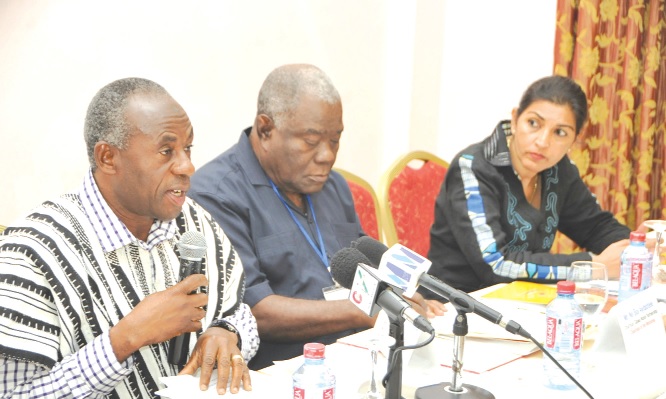Early warning system on floods developed
 A flood forecasting and early warning system aimed at giving prior notice to flood-prone communities in the Northern Region has been developed.
A flood forecasting and early warning system aimed at giving prior notice to flood-prone communities in the Northern Region has been developed.
Advertisement
The system is dubbed the “White Volta Flood Hazard Assessment and Forecasting” and with it, experts from the Water Resources Commission (WRC) and the Hydrological Services Department can now provide information on expected floods three days ahead of the expected disaster.
This gives the National Disaster Management Organisation (NADMO), local authorities and other agencies ample time to evacuate people, bring in supplies and also support the affected communities.
Launching the system in Accra yesterday, the Minister of Water Resources, Works and Housing, Alhaji Collins Dauda, said the move underscored the value placed on advance planning and flood management in the country.
The project, financed by the World Bank’s Global Facility for Disaster Reduction and Recovery, was in response to a request made by the government of Ghana in 2010, for better management of flood-related problems in the northern part of the country.
The assessment covered the genesis of the flooding of the White Volta, the exposure of various assets and communities to floods and the adoption of effective structural and non-structural measures to reduce flood impacts.
“As a country, we look forward to also benefiting from the developed flood early warning system by reducing physical and economic losses. It is appropriate to reduce drastically damage to homes, schools, health facilities and the livelihoods of the vulnerable in the area,” Alhaji Dauda said.
Critical measures
He said it was common to hear of cases of critical systems and measures having been developed but left unused, adding, “I hope the results of this project will not suffer the same fate to the disadvantage of potential victims of future floods.”
He entreated key operational institutions, including the Ghana Meteorological Agency and the Volta River Authority, to enhance their level of cooperation and coordination in operating and using the system.
The World Bank Country Director for Ghana, Mr Yusupha Crookes, expressed the hope that the assessment would assist the government of Ghana to reduce the social and economic losses that resulted from flooding in the northern part of Ghana.
“It is also worthy to note that the project has highlighted the dependency of key sectors such as agriculture, energy, transport and health on climate risks. As such, a better understanding and management of climate risks is crucial to Ghana’s socio-economic growth,” he said.
Mr Crookes, however, said sustainable financing and modern hydrological and meteorological systems were critical elements not only to sustain the current economy but also proactively address the challenges of tomorrow.
In his welcoming address, the acting Executive Secretary of the WRC, Mr Ben Y. Ampomah, said the assessment would be useful for the management of floods.
“More importantly, this model may also inspire initiatives to advance the management of floods in other parts of the country with similar challenges and eventually the entire Volta River Basin,” he said.
By Dominic Moses Awiah & Vincent Mensah/Ghana



